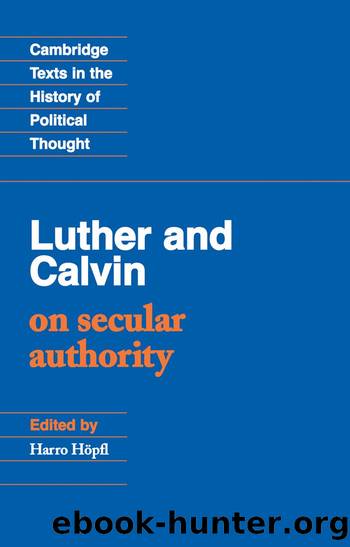Luther and Calvin on Secular Authority (Cambridge Texts in the History of Political Thought) by John Calvin & Martin Luther

Author:John Calvin & Martin Luther [Calvin, John]
Language: eng
Format: epub
Publisher: Cambridge University Press
Published: 1991-09-27T06:00:00+00:00
* * *
1 Literally: to make princes into pagans. Scholastic theologians (the âsophistsâ) standardly reconciled the hard sayings of Christ to which Luther refers with the exigencies of practice by distinguishing between what was necessary for âperfectionâ and what was adequate for those less spiritually ambitious.
2 Lutherâs casual habits of expression and the obsolete conceptual equipment of âestatesâ (for which see the Glossary) here makes an expansion necessary.
3 An den Christlichen Adel deutscher Nation (Appeal to the Christian Nobility of the German Nation), 1520.
4 Luther is referring to the demand of certain Catholic rulers that their subjects surrender their copies of Lutherâs German translation of the Bible.
5 Or faith; the German word Glaube has both meanings.
6 Lutherâs expression here is very crabbed. âObedient Christian princesâ is in the original; Lutherâs term Fürst does not necessarily mean a âsovereignâ.
7 The territories subject nominally or in fact to the Holy Roman Emperor at that time also included Spanish, Italian and Burgundian as well as German and Austrian territories, so Luther seems to be making a distinction.
8 Literally: âhis scalesâ (the Devil was often depicted as having scales or plates like a fish or crocodile; see the passage on Leviathan in Job 41, normally interpreted as referring to the Devil) âand waterbubblesâ: this is a play on words of which âand all his bullâ might be a faint imitation; the Latin word bulla literally means a bubble, the reference being to the seal. Luther found this pun irresistible.
9 Literally: âuntil the grey-coats (ie. monksâ habits) vanishâ, apparendy an idiom.
10 For Lutherâs use of the metaphor of the Sword, see the Introduction, p. xvi.
11 Ordnung may mean an ordinance or an order. The translation of this crucial text which Luther offers here is not that of his later versions in his German Bible. The word I have here translated as âpowerâ (Gewalt) he later rendered as Oberkeit, in later German this became Obrigkeit. Cf. Introduction, p. xv, and Glossary: power.
12 Literally âestateâ; cf. Glossary. For Lutherâs thinking about the morality of soldiering, cf. for example: Ob Kriegsleute auch im seeligen Stand sein könnten (Whether Soldiers too can be in a State of Grace), 1526.
13 The implicit reference is to the parable in Matthew 7.18.
14 i.e. Sermons on the Churchâs Year, cf. Weimar edition, 10:2:152â70.
15 Fromm; cf. Glossary: just. Note that Lutherâs German here is ambiguous, more so than some commentators allow. He does not say that no one in the world is a Christian or just, merely that no one is so ânaturallyâ, which may mean either that some are both, but by divine grace alone, or it may mean, as commentators would like it to mean, that Christians in their outward conduct remain imperfect. It is not in the least obvious that Luther meant the latter, and the lack of clarity is significant, given Lutherâs previous bipartite division of the human race, and his insistence that it is âChristiansâ, and not human beings to the extent that they actually behave like Christians, who need no sword or law.
Download
This site does not store any files on its server. We only index and link to content provided by other sites. Please contact the content providers to delete copyright contents if any and email us, we'll remove relevant links or contents immediately.
Angels by Billy Graham(1549)
How To Be Born Again by Billy Graham(1404)
Peace with God by Billy Graham(1318)
Unbroken Curses by Rebecca Brown & Daniel Yoder(1180)
God's Prophetic Symbolism in Everyday Life by Adam Thompson & Adrian Beale(1130)
The School of Biblical Evangelism by Ray Comfort(1100)
Martin Luther: The Man Who Rediscovered God and Changed the World by Eric Metaxas(1089)
Power over the Enemy by John Osteen & Joel Osteen(1076)
Call by Rick Joyner(1056)
Jonathan Edwards: A Life by Marsden George M(954)
The Supernatural Power of a Transformed Mind Expanded Edition: Access to a Life of Miracles by Bill Johnson(947)
Unmasking the Devil: Strategies to Defeat Eternity's Greatest Enemy by John Ramirez(924)
Prayers That Bring Healing and Activate Blessings: Experience the Protection, Power, and Favor of God by John Eckhardt(920)
Fresh Wind, Fresh Fire by Jim Cymbala(913)
An Altar in the World by Barbara Brown Taylor(903)
Reformation Theology by Littlejohn Bradford(887)
Liturgy of the Ordinary by Tish Harrison Warren(878)
Seeing the Voice of God: What God Is Telling You through Dreams and Visions by Smith Laura Harris(873)
Martin Luther by Mansch Larry D.; Peters Curtis H.;(859)
